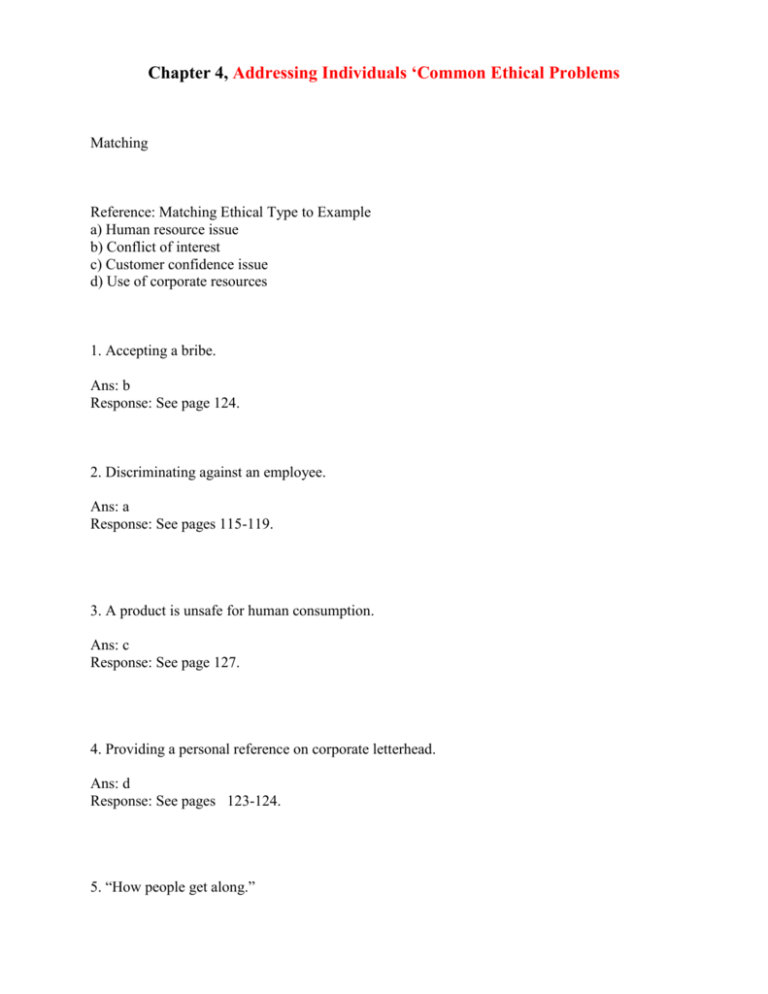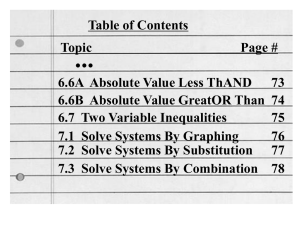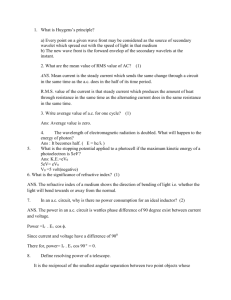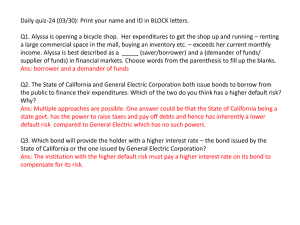
Chapter 4, Addressing Individuals ‘Common Ethical Problems
Matching
Reference: Matching Ethical Type to Example
a) Human resource issue
b) Conflict of interest
c) Customer confidence issue
d) Use of corporate resources
1. Accepting a bribe.
Ans: b
Response: See page 124.
2. Discriminating against an employee.
Ans: a
Response: See pages 115-119.
3. A product is unsafe for human consumption.
Ans: c
Response: See page 127.
4. Providing a personal reference on corporate letterhead.
Ans: d
Response: See pages 123-124.
5. “How people get along.”
Ans: a
Response: See page 114.
6. Honestly representing a product in a sales pitch.
Ans: c
Response: See page 129.
7. Keeping a customer’s information private.
Ans: c
Response: See pages 125; 128.
8. Sending personal mail through the company mail room.
Ans: d
Response: See page 134.
True/False
9. With human resource issues, the most important word to remember is “fairness.”
Ans: True
Response: See page 114.
10. Employees do not care about the fairness of the decision making procedure as much as they
care about the fairness of the outcomes they receive.
Ans: False
Response: See page 115.
11. If an organization has 30 employees, it is not required to have a sexual harassment policy or
train employees on these issues.
Ans: False
Response: See page 119.
12. An employer cannot be held liable for an employee’s sexual harassment activities.
Ans: False
Response: An employer may be held liable if the employer had knowledge of the conduct and
did nothing to correct it. See page 121.
13. John works for Kinjo’s Printing Services during the day and Joe’s Diner at night. This is a
conflict of interest.
Ans: False
Response: See pages 123; 125.
Multiple Choice
14. When something is divided between two people according to the worth and inputs of the two
individuals, it is said to be ___________ and represents one component of “fairness.”
a) reasonable
b) impartial
c) equitable
d) unbiased
Ans: c
Response: See pages 114-115.
15. ___________ refers to the fairness of exchanges: “You did this for me and I’ll do that for
you.”
a) reciprocity
b) equality
c) impartiality
d) shared resources
Ans: a
Response: See page 115.
16. Identify the three components that are used to define “fairness.”
a) reciprocity, equality, and impartiality
b) reasonableness, equality, and sensitivity
c) reciprocity, equity, and impartiality
d) joint understanding, equality, and neutrality
Ans: c
Response: See page 114.
17. Which of the following is true?
a) Discrimination is an intentional bias that affects behavior.
b) Discrimination occurs whenever something other than qualifications affects how an employee
is treated.
c) Discrimination is prohibited under Title VII of the Civil Rights Act of 1964 against
individuals who are under 40 years old against age discrimination.
d) Discrimination is always overt and clear.
Ans: b
Response: See page 115.
18. Which of the following is false?
a) Sexual harassment is any unwelcome sexually oriented behavior that makes someone feel
uncomfortable.
b) Sexual harassment is objective.
c) Sexual harassment is determined from the point of view of a “reasonable” person regardless of
the harasser’s intentions.
d) Sexual harassment generally involves issues of power and not romance.
Ans: b
Response: See page 119.
19. Which of the following is most likely an appropriate “gift” to accept from a vendor?
a) A discount on personal items purchased from the vendor
b) Dinner for you and your wife at Applebee’s
c) Four tickets to the Super Bowl
d) A cash gift of $1,400
Ans: b
Response: See page 124.
20. When a statement is “off the record,” this means:
a) Anything you told the reporter before you said “off the record” cannot be used in the
reporter’s story.
b) Your identity is completely protected; no one will be able to figure out the information came
from you.
c) A reporter cannot put any of the information you provided in his or her story.
d) A reporter can use the information you provided in a story as long as the remarks are not
attributed directly to you.
Ans: d
Response: See page 134.
21. Which of the following is true?
a) If you find out that your manager is behaving unethically, you should go directly to the CEO
of the company before talking with anyone else.
b) Issues that involve employee or customer rights are not serious enough to consider “blowing
the whistle.”
c) Under the False Claims Act, you can receive 15 to 30 percent of whatever damages the federal
government recovers if you blow the whistle on government fraud.
d) Most whistle-blowing cases are not resolved until they are reported outside of the company.
Ans: c
Response: See page 143.
22. ____________ is a type of sexual harassment wherein a worker is made to feel
uncomfortable because of unwelcome actions relating to sexuality.
a) quid pro quo
b) section 7 harassment
c) hostile work environment
d) power-relations
Ans: c
Response: See page 120.
23. _____________ is a type of sexual harassment wherein an individual believes that sexual
favors are a requirement for advancement in the workplace.
a) quid pro quo
b) section 7 harassment
c) hostile work environment
d) power-relations
Ans: a
Response: See pages 119-120.
Additional Questions
24. The broad categories of typical ethical problems individuals ace in the workplace include all
of the following except
a.
b.
c.
d.
e.
Human resources issues
Conflicts of interest
Customer Confidence Issues
Use of Corporate Resources
Leadership concerns
Ans.: e
Response: See page 11
25. It is important to avoid romance with anyone you supervise for the following reasons: 1)
Your judgment is likely to be compromised by the relationship 2) Coworkers are likely to lose
respect for both parties and fear preferential treatment.
Ans.: True
Response: See page 122
26. Common conflicts of interest include overt or covert bribes and the trading of influence or
privileged information.
Ans.: True
Response: See page 124
27. Accepting discounts on personal items from a vendor is acceptable as it enriches the
relationship between the parties.
Ans.: False
Response: See page 125
28. Transparency is the best policy in holding more than one employment option. Thus, so long
as you tell both employers about the work you are doing, the work you perform at either firm is
not relevant.
Ans.: False
Response: See page 125
29. Conflicts of interest erode trust by making it look s if special favors will be extended for
special friends.
Ans.: True
Response: See page 126
30. You should guard your reputation as it is built slowly with countless actions but it can be
destroyed in an instant by one foolish mistake.
Ans.: True
Response: See pages 131-132
31. As a senior executive, it makes sense for you to use the firm’s corporate letterhead to write
references for employees leaving the firm who have previously served the firm well.
Ans.: False
Response: See page 132
32. Facebook, LinkedIn and other social networking sites are immune from ethical challenges as
that which you post on these sites is personal and may not be examined by your firm.
Ans.: False
Response: See page 133








